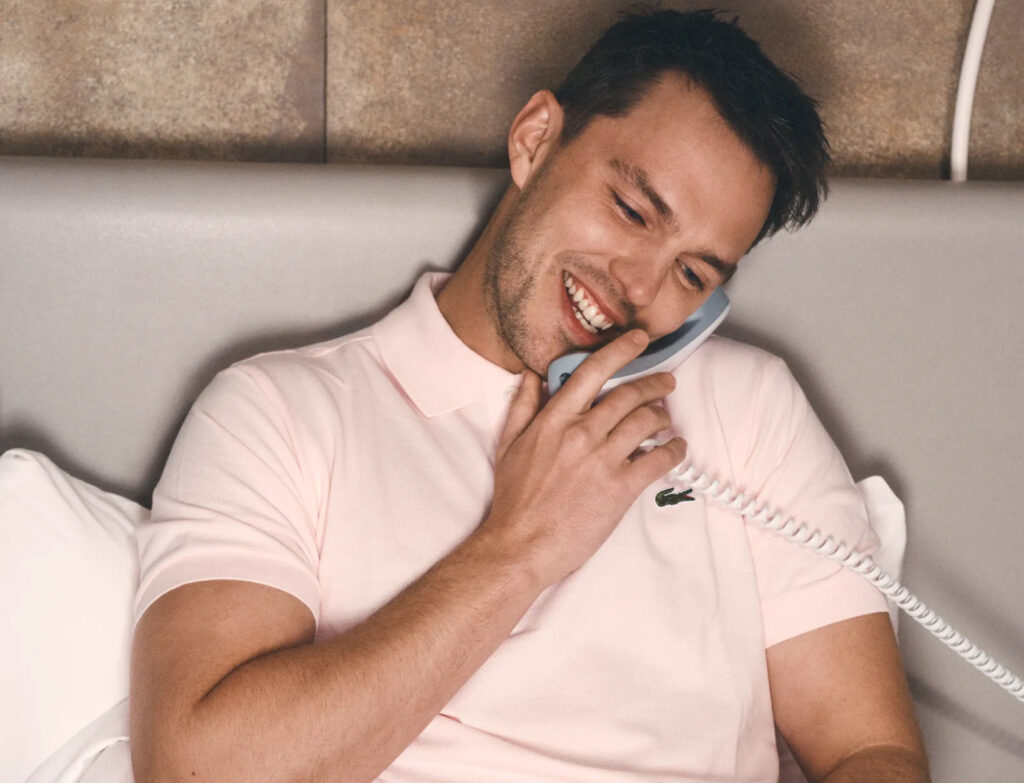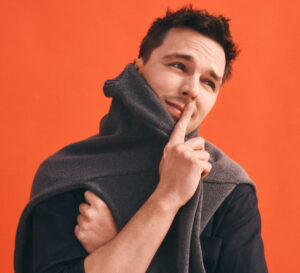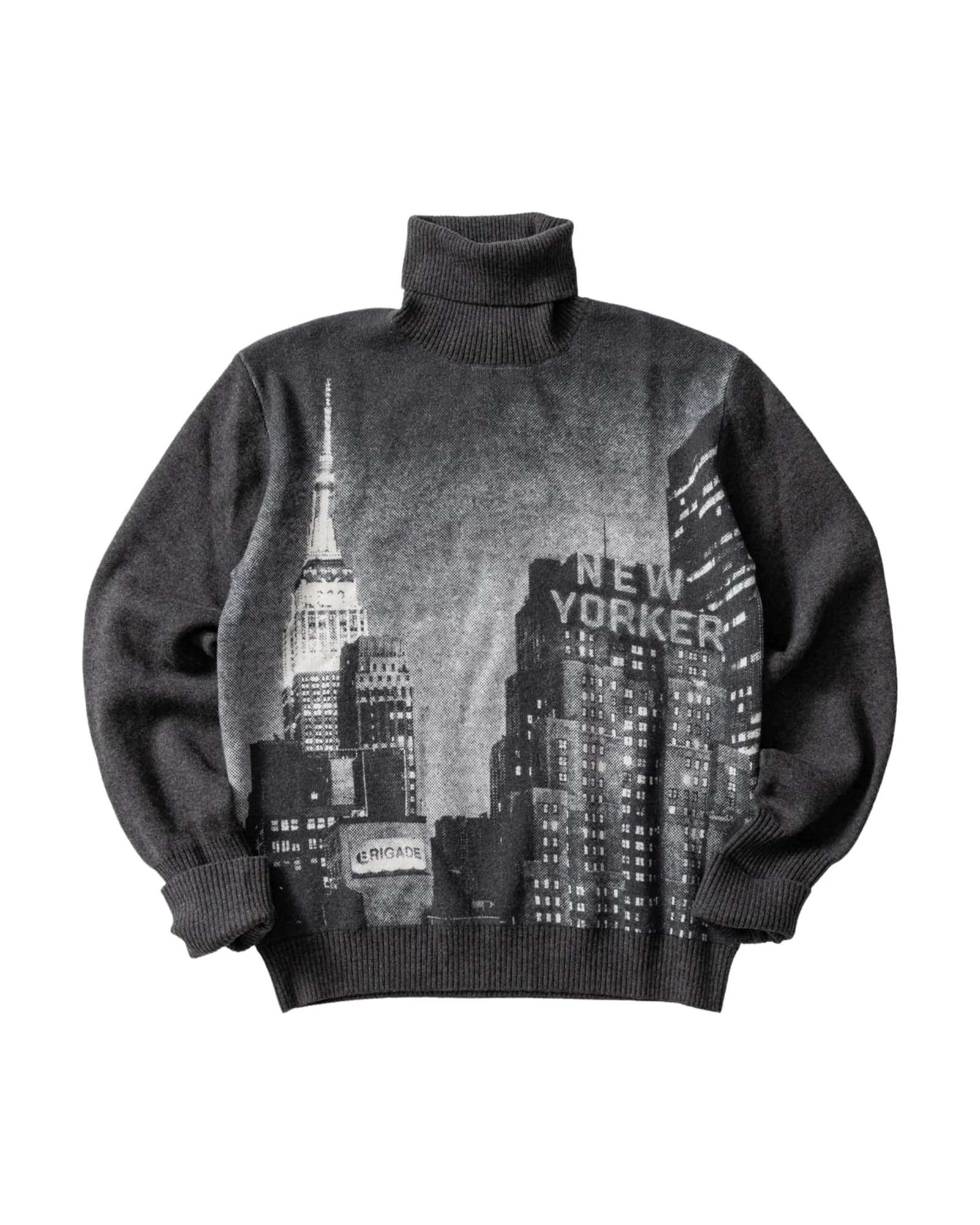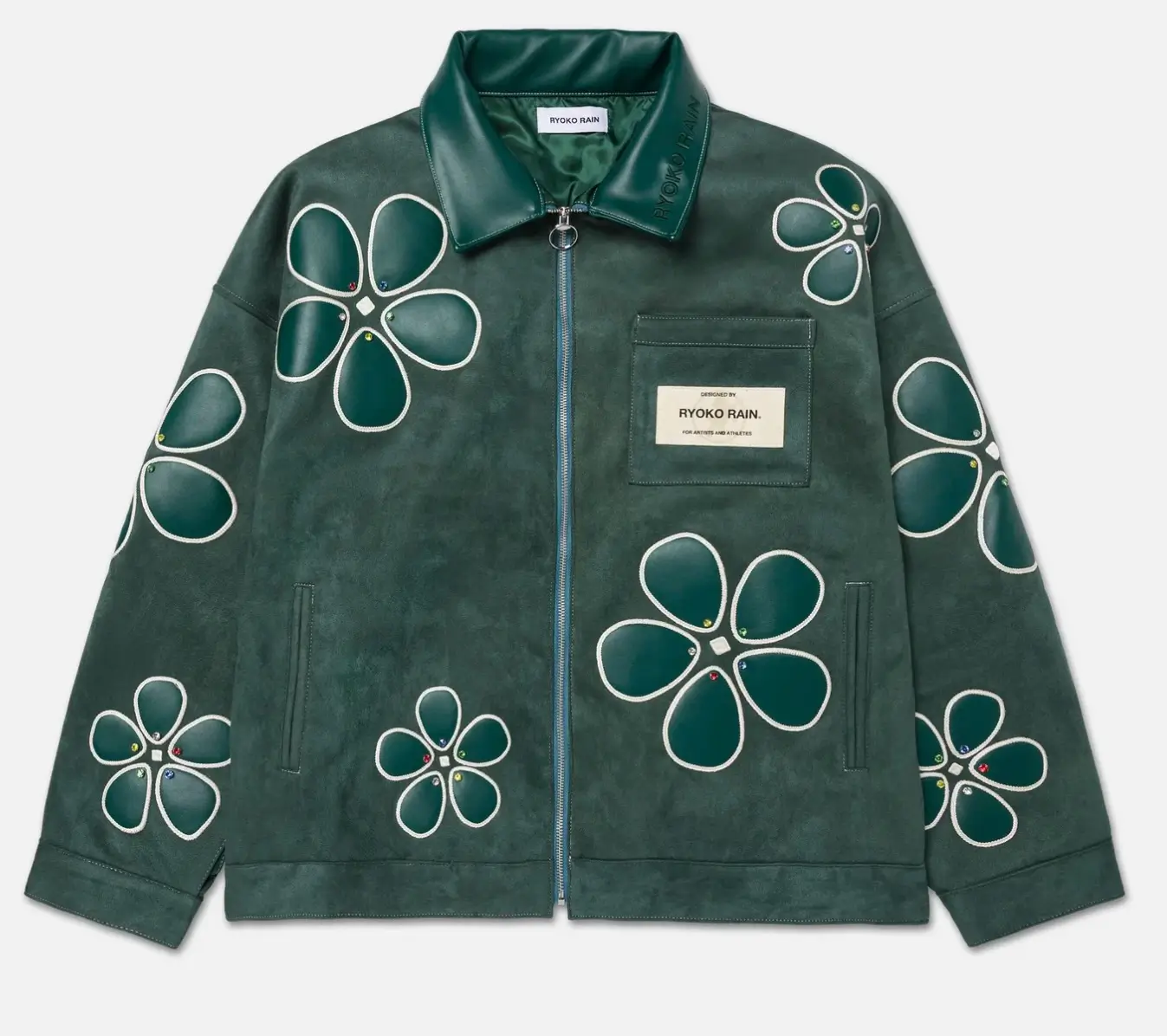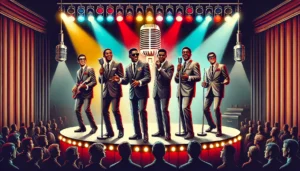Photography by Ilya Lipkin | Styling by Thom Bettridge
The waitress at Zinc Café doesn’t usually speak up. Celebrities drift through all the time—low-key types with sunglasses, wellness juices, and scripts under one arm. But today, something compels her.
“I know you, right?” she asks.
Nicholas Hoult, 6’3”, wearing a Studio Nicholson sweater and a cap marked Focus Features, blushes like a schoolboy. “Maybe,” he says, voice soft. “I don’t know.”
She later tells me she remembered him from Warm Bodies—that 2013 cult-favorite where Hoult played a zombie falling in love. More recently, she’s been down a TikTok rabbit hole of Nosferatu content, clips from Robert Eggers’ atmospheric reimagining where Hoult plays Thomas Hutter, the doomed solicitor sucked into the vampire’s nightmarish domain. He’s been showing up in the algorithm a lot lately.
It’s emblematic of Hoult’s career: ever present, but elusive. Not a megastar, not a recluse. A face you recognize before the name. But once you know the work, you start seeing him everywhere.
Hoult has been acting for more than two decades, but there’s still something about him that feels like a secret. Maybe because he doesn’t demand attention—he deflects it, in fact. Where many actors gravitate toward persona-building, Hoult drifts toward character.
He was just 12 when About a Boy made him famous—a wiry kid with earnest eyes and messy hair, playing opposite Hugh Grant. That performance, equal parts awkward and affecting, still holds up. Most child actors flinch under the pressure of early fame. Hoult adapted. He never chased the spotlight. He just kept working.
From there, his trajectory was nonlinear. In his teens and early twenties, he swerved between British indies and studio fare. As Tony Stonem in Skins, the BBC’s brash, drug-soaked teen drama, he radiated toxic charisma. It was a sharp contrast to his About a Boy image—darker, sexier, complex. And it caught Hollywood’s eye.
Then came the X-Men years. As Hank McCoy, aka Beast, Hoult was part of a major franchise reboot—blue fur, genius intellect, and all. He played the role with more nuance than it required, subtly charting Hank’s tension between brain and brawn, man and monster. The films (First Class, Days of Future Past, Apocalypse, Dark Phoenix) weren’t all great, but Hoult was consistently strong, anchoring the chaos with calm conviction.
And then: Mad Max: Fury Road.
If there’s a singular turning point in Hoult’s adult career, it’s 2015’s Fury Road. In George Miller’s roaring desert epic, he played Nux—a chalk-white warboy addicted to death and adrenaline, who gradually becomes the film’s heart. It’s a physical, raw performance, full of twitchy energy and unexpected tenderness. “What a lovely day!” he screams as he drives into near-certain doom. And we believe him.
This is where Hoult’s range became impossible to ignore. He could be grotesque, soulful, broken, absurd—sometimes in the same scene. He wasn’t just the polished supporting guy anymore. He was risk-taking, unpredictable.
He followed Fury Road with a series of shrewd choices. In The Favourite, he played Harley—a scheming, powdered-wig politician who wielded insults like weapons. It’s a supporting role, but unforgettable. Hoult, decked out in brocade and eyeliner, is hilariously venomous. “You look like a badger,” he hisses in one scene. And it’s not just funny—it’s surgical. He delivers every line like a tiny assassination.
Then came The Great, Hulu’s riotous anti-period piece in which Hoult played Peter III of Russia—idiotic, cruel, magnetic, and, against all odds, kind of lovable. It’s perhaps his finest role to date: a multi-season exercise in balancing satire with sincerity. As Peter, Hoult shifted from buffoon to tragic figure with finesse. One minute he’s forcing nobles to wrestle bears for entertainment, the next he’s grieving his mother in a way that’s genuinely moving.
“It was a dream role,” he says. “There was room to be ridiculous, but also human. I loved walking that line.”
That line—between the comic and the tragic, the real and the surreal—is where Hoult thrives.
It’s also what makes his turn in Nosferatu so gripping. Directed by Robert Eggers, the film is a shadow-soaked nightmare. Hoult plays Hutter, the man sent to close a real estate deal with Count Orlok, only to spiral into horror and obsession. It’s a Gothic fever dream—and Hoult grounds it.
“I loved working with Robert,” Hoult says. “There’s a sense of ritual to everything. Every shot, every line, is precise. But within that, there’s room to be messy, emotional.”
Hoult’s performance in Nosferatu is a slow-burn collapse. He starts prim, composed, slightly naive. But as Orlok’s influence grows, so does the disintegration—of his sanity, his body, his morality. It’s less about screams and more about suggestion. A twitch in the eye. A pause between words. The horror creeps in sideways.
Critics praised his restraint. In a film full of baroque visuals and supernatural menace, Hoult is the human anchor—the man unraveling in real time.
“It’s exhausting, in a good way,” he says. “You’re not acting fear. You’re inhabiting it. You carry it in your body.”
Despite the recent acclaim, Hoult is still difficult to box in. He doesn’t self-mythologize. He doesn’t chase IP. He takes roles that interest him—and then disappears into them.
Even in films that didn’t quite land (Renfield, Those Who Wish Me Dead), Hoult was rarely the problem. In Renfield, he played Dracula’s tormented servant with a comic lightness that almost saved the movie. In The Menu, he was perfectly cast as a smug foodie so obsessed with experience he misses the danger simmering around him. Each role is a self-contained experiment.
And there’s more to come. Rumors swirl about upcoming dramatic work, maybe another collaboration with Eggers or a return to theater. Hoult doesn’t confirm anything, just smiles. “There are a few things in the works. We’ll see.”
Away from set, he lives a deliberately quiet life. He and partner Bryana Holly raise two children in LA, avoiding red carpets and interviews unless absolutely necessary. “I’m happy being boring,” he says. “It’s good for the work.”
He’s not on social media, not pushing a fashion line or hawking supplements. “I like acting,” he says. “That’s the gig.”
That simplicity might explain his longevity. While others burn bright and vanish, Hoult keeps shifting shape, growing sharper, stranger, more compelling.
He’s not trying to be your favorite actor. But more and more, he’s becoming one.
As we leave Zinc, the waitress waves goodbye. She’s still not entirely sure if she should’ve said something earlier, but she’s glad she did. Hoult thanks her, still flushed from the encounter.
In another life, he might’ve leaned into the fame, the recognition, the “moment.” But he doesn’t. He just slides his hands into his pockets and blends back into the city.
A star, just slightly out of sight. Exactly where he likes to be.
No comments yet.

